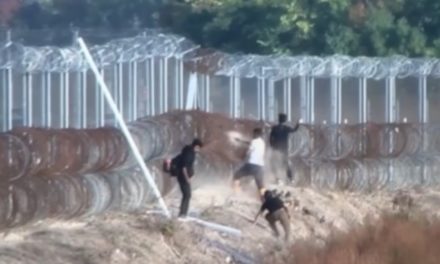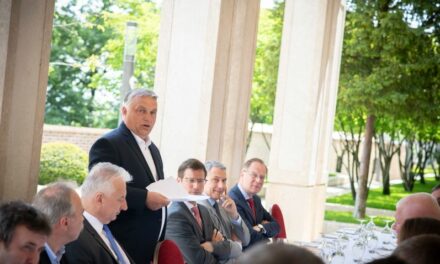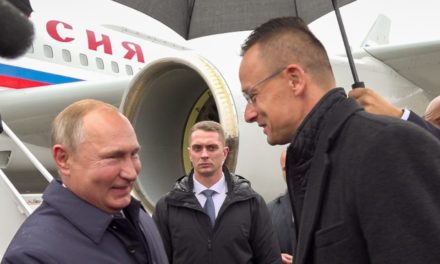It is important for us in Hungary that Hungarian Jews feel safe every day, "today, tomorrow, and the day after," emphasized the Parliamentary State Secretary of the Ministry of the Interior on Sunday, on the Memorial Day of the Hungarian Holocaust victims in Budapest, at the Páva Street Holocaust Memorial Center.
Bence Rétvári said: it is a suffocating feeling and it is incomprehensible to human reason how a historical era, an ideology can strive to kill hundreds of thousands, millions of people, to execute them, to drag them en masse to death camps. According to his words, hearing the personal stories of the survivors, one can feel the fear, pain, vulnerability of the victims, and the grief of the relatives. The government politician stated:
no part of history can be erased, and no one can seek to erase any part of it.Speaking in favor of the importance of memorial sites, he emphasized that it is necessary for those who cannot visit the graves of their deceased relatives to be able to remember. The wounds caused by the Holocaust have not healed and will never heal, he said.
"The protection of human life is always our obligation," he emphasized, and then he also recalled the activities of the rescuers of the time of emergency, including the Hungarian Catholic nun Margit Slachta, the founder of the Society of Social Brothers, the first Hungarian female parliamentarian.
Bence Rétvári emphasized that the relativization of the Holocaust hurts all people. He continued: that is why it is shocking to many when a leading Hungarian politician can still be a person who believes that "it is necessary to look at" how many people of Jewish origin are in the Parliament and the government, because in his opinion they pose a risk to national security, just as - also his according to his conviction - every single citizen of Israel is a national security risk. "These words are unacceptable, and not only for Jews," he stated.
According to Bence Rétvári, we must do everything every day so that all our Jewish compatriots can feel safe in Hungary. Citing a survey by The Jewish Policy Research, the Secretary of State said that
After Italy, Hungary is the safest European state for Jews, followed by Denmark.Warning about contemporary anti-Semitism, anti-Jewish and anti-Israel phenomena, he said that with the increase in illegal immigration in Europe, "unfortunately, a new wave of anti-Semitism has appeared". As an example, he mentioned that five anti-Jewish crimes are committed in Germany every day, according to the German authorities, a Holocaust memorial was vandalized in the Netherlands, and synagogues were shot at several times in France.
Andor Grósz , chairman of the board of trustees of the Holocaust Documentation Center and Memorial Collection Public Foundation, recalling the historical events of that time and emphasizing the importance of remembrance, called it important for young people to learn about the history of the Holocaust. "The Shoah becomes an integral part of social memory when, as adults, we see them commemorated at memorial sites, at synagogues that are still functioning, at our churches that have been converted into community centers, libraries, or furniture warehouses, on memorial plaques, and at stumbling blocks," he said .
In his speech, Andor Grósz approved that the government had declared zero tolerance for anti-Semitism, but at the same time warned of the "innumerable stealthy" forms of anti-Semitism that "try to influence public thinking under the radar."
He called the attempts to exonerate the perpetrators of the Holocaust one of its particularly dangerous forms. He put it this way: "the role of the Nazis was decisive in the deportations, but anti-Semitism did not arrive in Hungary with the German occupation." According to his words, therefore, all people of good sense should object to naming streets after them or erecting statues to them.
In her Holocaust survivor speech, Katalin Sommer He added: the parents did not tell about these terrible times, so "we, who were children, were left with the task of telling this story personally".
At the end of the commemoration, the participants said the kaddish, then placed candles and stones at the memorial wall of the victims.
Among others, Jákov Hadasz-Handelszman , Israel's ambassador to Budapest, András Heisler , president of the Association of Hungarian Jewish Communities, Róbert Répássy , state secretary of the Ministry of Justice and the head of several foreign missions took part in the event.
According to the decision of the Parliament in 2000, since 2001, every year on April 16, the Memorial Day for the victims of the Holocaust will be held in Hungary, remembering that in 1944, on this day, the confinement of Jewish people in Transcarpathia began on this day.
Source and title image: MTI/Zoltán Balogh











